▼ Hassan Rouhani is Iran's president for second term [05-22-17]
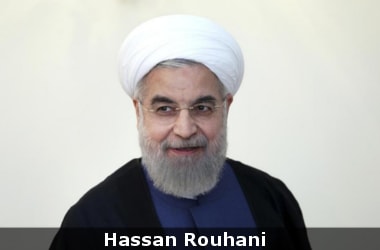 Hassan Rouhani has been re-elected as the President of Iran. Hassan Rouhani has been re-elected as the President of Iran.
He was elected as president for his first term in 2013.
He won 2013 elections by pledging to end Iran’s isolation and improve civil rights at home.
Rouhani was born in Semnan province on November 12, 1948.
He is a graduate of University of Tehran and did his PhD from Scotland’s Glasgow Caledonian University.
The 68 year old Rouhani is a lawyer, academic and a former diplomat.
Rouhani has won his second term by presenting himself as the candidate of change and social freedoms that ended many sanctions and a 13 year standoff over Iran’s nuclear programme.
He has held various key positions like the key defence portfolios during the 1980 -88 Iran-Iraq war. He had spent 16 years as secretary of the Supreme National Security Council, which is Iran’s top security post.
Rouhani consistently worked to rebuild Irans’ relations with the West.
He also became the first Iranian leader to speak with the President of United States when Barack Obama phoned in September 2013.
Iran: Know More
- Capital: Tehran
- Currency: Iranian rial
- President: Hassan Rouhani
- Supreme leader: Ali Khamenei
|
▼ French president appoints Edouard Philippe as next PM [05-16-17]
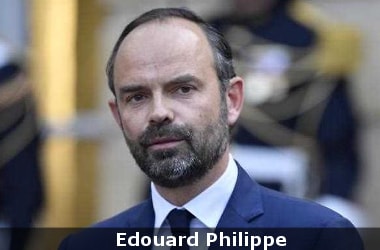 French President Emmanuel Macron has picked centre-right mayor of the northern port city of Le Harve, Edouard Philippe (46), as his Prime Minister. French President Emmanuel Macron has picked centre-right mayor of the northern port city of Le Harve, Edouard Philippe (46), as his Prime Minister.
The appointment of Philippe, a moderate from France’s mainstream right-wing party Les Republicains, is seen as a strategic move that could secure the support Macron needs to win a majority in the 577-seat National Assembly, the lower house of Parliament.
This is the first time in the history of the Fifth Republic that a President has appointed someone from outside his own party without being explicitly required to do so by a parliamentary vote.
Macron, who was Economy Minister in the Socialist government during 2014-16, already enjoys considerable support among former Socialists, including former Prime Minister Manuel Valls, against whom La Republique en Marche (REM),
Macron’s movement, is not fielding a candidate in the assembly elections. Additionally, all current MPs whom the REM has so far given tickets to are drawn from the Socialist party.
The French Prime Minister is required to have the support of the majority of MPs in its National Assembly and Philippe’s appointment is being seen as the President reaching out to the right – a move that could help his party push reforms through Parliament.
Macron was elected on a platform that promised reforms to labour and social security laws, training for workers, and relaunching the European Union.
Edouard Philippe: Know More
- Trained as a lawyer, Mr. Philippe has worked in the private sector, including for French nuclear giant Areva and an American law firm.
- Philippe’s early political leanings were with the Socialist Party, but later he came to be associated with former President Jacques Chirac and former centre-right Prime Minister Alain Juppe’s Union for a Popular Movement.
- Juppe, also a presidential hopeful, lost the Les Republicains primaries in 2016.
|
▼ Dr. Hubert Minnis is Bahamas PM [05-16-17]
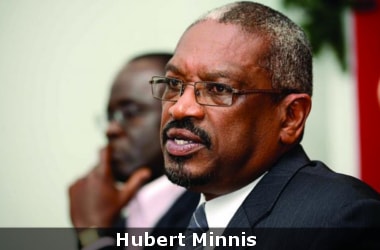 Dr Hubert Minnis was on 11th May sworn in as the fourth Prime Minister of the Commonwealth of The Bahamas since the country gained political independence from Britain in 1973. Dr Hubert Minnis was on 11th May sworn in as the fourth Prime Minister of the Commonwealth of The Bahamas since the country gained political independence from Britain in 1973.
Minnis, a medical doctor and former minister of health was sworn into office late Thursday at Government House by Governor General Dame Marguerite Pindling.
Hubert Minnis pledged, on behalf of his colleagues, their commitment to serve with integrity as Her Majesty’s Bahamas Government.
He added that he looked forward to the “most cordial relations” with her office in the service of the nation.
On May 10, Minnis led his Free National Movement (FNM) party in a landslide victory. The FNM was able to pull off a stunning defeat securing 34 of 39 constituencies.
Bahamas: Know More
- Coral based archipelago in the Atlantic Ocean
- Capital: Nassau
- Dialing code: +1
- Currency: Bahamian dollar
- Recognised regional languages: Bahamian Creole
|
▼ Moon Jae-in wins South Korea presidential elections [05-11-17]
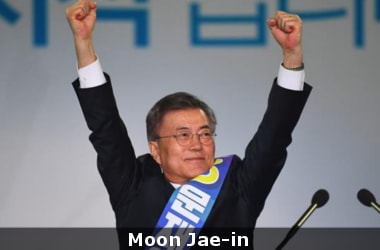 Moon Jae-in has been declared winner in South Korea’s presidential election by that country’s National Election Commission. Moon Jae-in has been declared winner in South Korea’s presidential election by that country’s National Election Commission.
Moon, the Democratic Party’s candidate has won with 41.08% of votes. Moon will replace the ousted President Park Geun-hye, who was ejected from office in March after a corruption scandal for which she’s awaiting trial.
Moon narrowly lost to Park in 2012 election.
Park was South Korea’s first female president. She has been impeached in a corruption scandal.
Moon is a 64 year old former human rights lawyer and a liberal who favours a more open policy toward North Korea.
Unlike predecessors, Moon favours engagement with North Korea and has challenged the deployment of US missile defence system in South Korea.
Moon is a staunch proponent of the “Sunshine Policy”, which aimed to improve relations between the two Koreas from 1998 to 2008.
Moon Jae-in: Know More
- A son of refugees who fled North Korea during the 1950-53 Korean War, in 1975, Moon was jailed for staging anti-government protests.
- Later, he became a human rights lawyer and defended the rights of poor labourers and student activists. In 1972, Moon became a part of a pro-democracy movement to topple the dictatorship of Park Chung-hee.
- Park Chung-hee ruled South Korea for 18 years.
- He was the father of recently ousted President Park Geun-hye.
|
▼ FBI director James Comey fired [05-10-17]
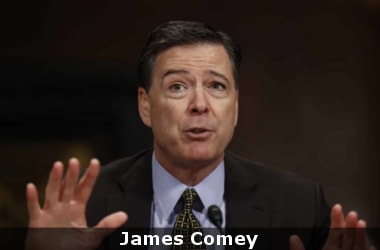 President Donald Trump has fired FBI Director James Comey who was leading the investigation into whether his election campaign had ties to Russia’s alleged interference in the US polls. President Donald Trump has fired FBI Director James Comey who was leading the investigation into whether his election campaign had ties to Russia’s alleged interference in the US polls.
In a letter, Mr. Trump told Comey that he was no longer effectively able to lead the bureau and it was necessary to restore public trust and confidence in it.
The shocking move comes days after Comey testified on Capitol Hill about the FBI’s investigation into Russia’s election meddling and a possible collusion between the country and Trump’s campaign.
In the letter, Trump acknowledged that Comey had informed him on three separate occasions that he was not under investigation.
The White House said the search for a new FBI director would begin immediately.
In a statement released by the White House, Trump mentioned the FBI was one of America’s most cherished and respected institutions and the dismissal will mark a new beginning for our crown jewel of law enforcement.
Comey had courted controversy during the 2016 presidential polls when he revealed a renewed investigation into Hillary Clinton’s email use, which the Democrat claimed had hurt her chances of becoming president.
FBI: Know More
- Formed: July 26, 1908; 108 years ago as the Bureau of Investigation
- Jurisdiction: U.S. Government
- Headquarters: J. Edgar Hoover Building Northwest, Washington, D.C., U.S.
- Motto: Fidelity, Bravery, Integrity
- Employees: 35,104 (as on October 31, 2014)
- Annual budget: 8.3 billion USD (FY 2014)
|
▼ Macron is France’s youngest president [05-8-17]
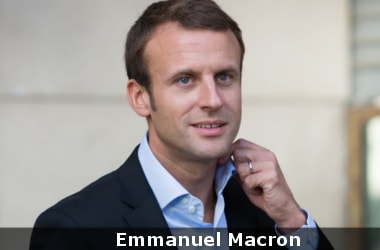 Emmanuel Macron has been a skilled student, a champion of France’s tech startup movement, an investment banker and economy minister. Emmanuel Macron has been a skilled student, a champion of France’s tech startup movement, an investment banker and economy minister.
But the man who will become France’s youngest president has never held elected office.
After a campaign based on promises to revive the country through pro-business and pro-European policies, the 39-year-old centrist independent defeated far-right nationalist Marine Le Pen and her protectionist, anti-immigration party.
He quit his job as a banker at Rothschild to become Socialist President Francois Hollande’s economic adviser, working for two years by Hollande’s side at the presidential palace.
Then as economy minister in Hollande’s government from 2014 to 2016, he promoted a package of measures, notably allowing more stores to open on Sundays and evenings and opening up regulated sectors of the economy.
In 2016, Macron launched his own political movement, En Marche, or In Motion, and quit the Socialist government.
He promised to shake up the political landscape by appointing a government that includes new figures from business and civil society.
His next challenge will be to get a parliamentary majority in an election next month to make major changes _ with no mainstream party to support him.
The strong advocate of a free market and entrepreneurial spirit has called for France to focus on getting benefits from globalization rather than the protectionist policies advocated by the far right.
In his political rallies, he encouraged supporters to wave both the French tricolour and the European Union flags.
Macron had an unexpected test of his political skills following the first round of the vote during what became known as ``the battle of Whirlpool,'' when Le Pen upstaged him at a Whirlpool factory in Amiens that is threatened with closure.
In a country shaken by recent terror attacks, he pledged to boost the police and military as well as the intelligence services and to put pressure on internet giants to better monitor extremism online.
To improve Europe’s security, he wants the EU to deploy some 5,000 European border guards to the external borders of the bloc’s passport-free travel zone.
Pro-European centrist Emmanuel Macron resoundingly won France’s landmark presidential election, first estimates showed on Sunday, heading off a fierce challenge from the far-right in a pivotal vote for the future of the divided country and Europe.
The victory caps an extraordinary rise for the 39-year-old former investment banker, who will become the country’s youngest-ever leader.
Initial estimates showed Macron winning between 65.5 per cent and 66.1 per cent of ballots ahead of Le Pen on between 33.9 per cent and 34.5 per cent.
Macron is now poised to become one of Europe’s most powerful leaders, bringing with him a hugely ambitious agenda of political and economic reform for France and the European Union.
The result will resonate worldwide and particularly in Brussels and Berlin where leaders will breathe a sigh of relief that Le Pen’s anti-EU, anti-globalisation programme has been defeated.
After Britain’s vote last year to leave the EU and Donald Trump’s victory in the U.S., the French election had been widely watched as a test of how high a tide of right-wing nationalism would rise.
Le Pen, 48, had portrayed the ballot as a contest between Macron and the “globalists” - in favour of open trade, immigration and shared sovereignty - and her “patriotic” vision of strong borders and national identities.
|
▼ Lawmakers of Germany approve package of security measures [05-2-17]
The lawmakers of Germany on 27 April 2017 approved a package of security measures that aims at preventing extremist attacks.
In this regard the lawmakers also partially banned the full-face burqa, the Islamic veil.
The new law on facial coverings falls short of a total ban in public places demanded by right-wing parties, like that in effect in neighbouring France since 2011.
The prohibition will apply to public servants - including election officials, military and judicial staff - performing their duties.
People will also be required to remove facial coverings in order to match them with their identity papers.
It talks about the use of electronic ankle bracelets, if approved by a judge, for people deemed a security threat, in federal police cases–like known Islamic radicals considered potentially violent by security services.
Under another new measure, Germany will implement EU rules on the exchange of flight passenger data to counter terrorism and serious crime.
Physical attacks on police, emergency services and military personnel on duty will in future be punished more severely, with up to five years’ jail.
|